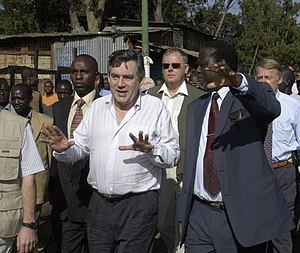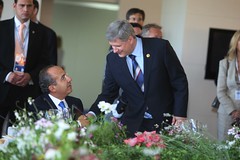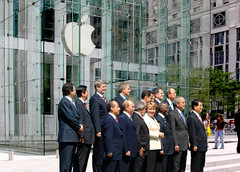Yes, it is of utmost importance to put an end to the gushing gallons of crude oil – about 5,000 barrels or 210,000 gallons of the icky slimy stuff billow out per day.
But even the once so-called “most green American president ever,” President Barock Obama hasn’t used this ecological disaster to forward his county’s green agenda.
Yet wasn’t it President Obama who boldly declared from his lofty pedestal in the White House’s Rose Garden: “We have to reduce America’s dependency on oil?”
Ironic, as America – and most of the western world – still depends on the highly toxic fossil fuel for everything from heating our homes, powering our cars, to creating plastics and rubbers used in everything from medical hoses to carry drugs and oxygen to patients, to the tires on our cars.
If the leader of the most powerful nation on Earth can’t truly go green, all hope may be lost.
One person may make a difference, but what really matters are the differences made by those in positions of real power.
So, don’t stop your recycling, and don’t switch back to energy wasting incandescent light bulbs just yet. By reducing your impact on the environment, you are making a difference.
However, oil slicks polluting our wetlands and killing off millions of fish, endangering the lives of birds, trashing our drinking water, and even harming human beings involved in the cleanup efforts will continue until world leaders – like President Obama – stop talking about making a difference and actually do.
Sure, President Obama has extended an American-led ban on deep-water oil drilling, but that was his response to a crisis which could have been prevented, had he acted on his previous promise to move his country further away from a dependency on oil. All he did today when he extended this moratorium to six-months was media damage control for his public image.
Sure, President Obama’s administration is holding congressional hearings specifically on BP’s oil spill – but even if BP is fined, and forced to pay the enormous costs to clean up their mess, that won’t prevent future oil disasters.
President Obama, and other worldly leaders need to get together on greening the planet – and I’m not talking about token carbon emissions. Whenever world leaders meet, they talk about reducing Greenhouse Gases by setting specific emission reduction goals –which often aren’t met.
What our world leaders need to do is to create a functional, working plan for implementing green energy alternatives in their respective countries.
Solar, wind and geothermal won’t work in every part of the globe. Not every spot on Earth receives enough sunlight for solar power, nor enough wind for wind power, nor has the underwater hotspots needed for geothermal.
However, every part of the globe can make use of at least one or more of these green alternatives – to realistically reduce our dependence on fossil fuels.
We may not completely eliminate our dependence on fossil fuels such as oil – yet. But if we had world leaders that made it law to use environmentally-friendly alternatives wherever possible, it would be just the incentive we need to reduce our use of fossil fuels, while invigorating the drive to research new ways to power our high-energy consumption lives.
Big business wouldn’t see green energy alternatives as a costly hassle, but rather a cheaper alternative to over-using fossil fuels and having to pay fines or added taxes for their wasteful ways. Having fines and heavy taxes on those relying on oil and other fossil fuels would also encourage companies to fund research into green energy alternatives, as it would now be in their interests to use the greener energy sources.
Having court hearings as to what went wrong in the Gulf of Mexico, and why after a month, the toxic crude oil is still leaking is important – we need to find out what went wrong to prevent oil spills from happening due to the same cause.
But the real way – the only way – we will ever truly avoid destroying the only planet we know of capable of sustaining our lives in our universe – is for world leaders to mandate environmentally-friendly alternatives to the point when they aren’t alternatives – they are the norm.
![Reblog this post [with Zemanta]](http://img.zemanta.com/reblog_e.png?x-id=82a6e1cb-13f3-4edc-9650-13661fe317a5)
![Reblog this post [with Zemanta]](http://img.zemanta.com/reblog_e.png?x-id=81e73daa-d508-43d7-b906-b06a66718f05)
![Reblog this post [with Zemanta]](http://img.zemanta.com/reblog_b.png?x-id=c6b8173c-87ef-4c9b-8cce-2fcf311feb06)

![Reblog this post [with Zemanta]](http://img.zemanta.com/reblog_b.png?x-id=a7fcbac6-5a8b-4f56-9145-6546fbe0b5cc)


![Reblog this post [with Zemanta]](http://img.zemanta.com/reblog_b.png?x-id=72f3b8d6-4078-4d44-9cae-7bb0da634ea5)


![Reblog this post [with Zemanta]](http://img.zemanta.com/reblog_b.png?x-id=d2e4b84f-d4fe-4585-a2e8-106d1e5c5d3d)

![Reblog this post [with Zemanta]](http://img.zemanta.com/reblog_b.png?x-id=4b10c61d-3979-432d-a79d-7089e19471fa)







